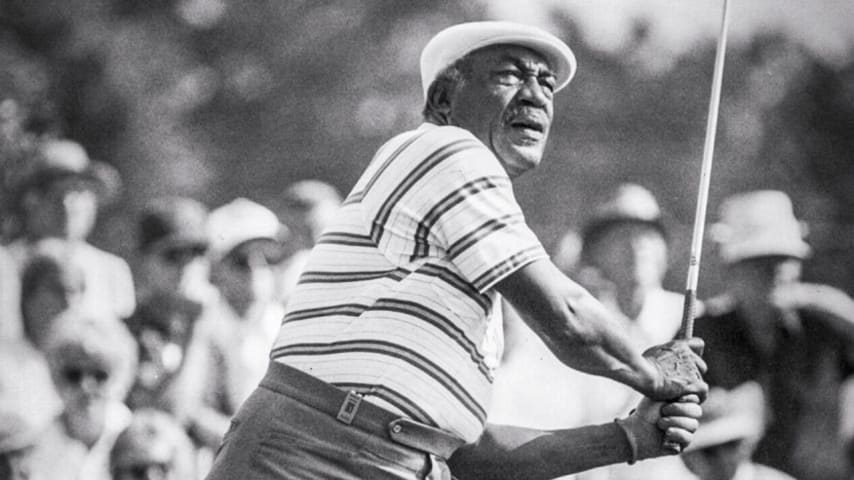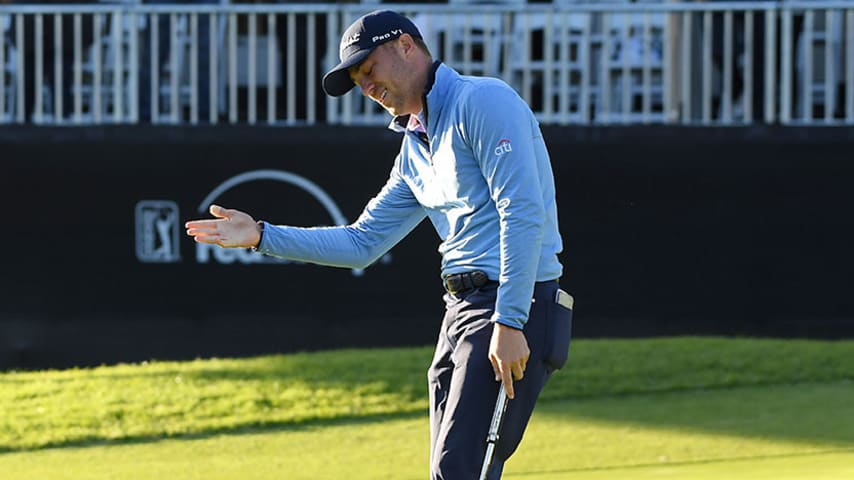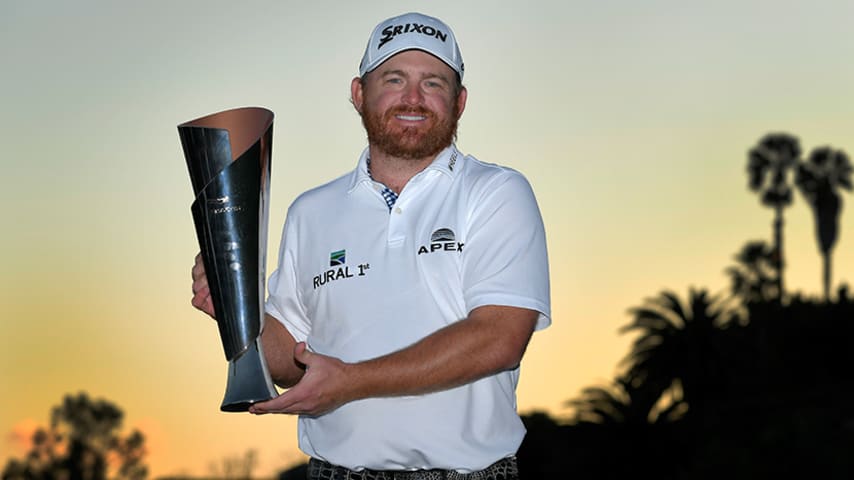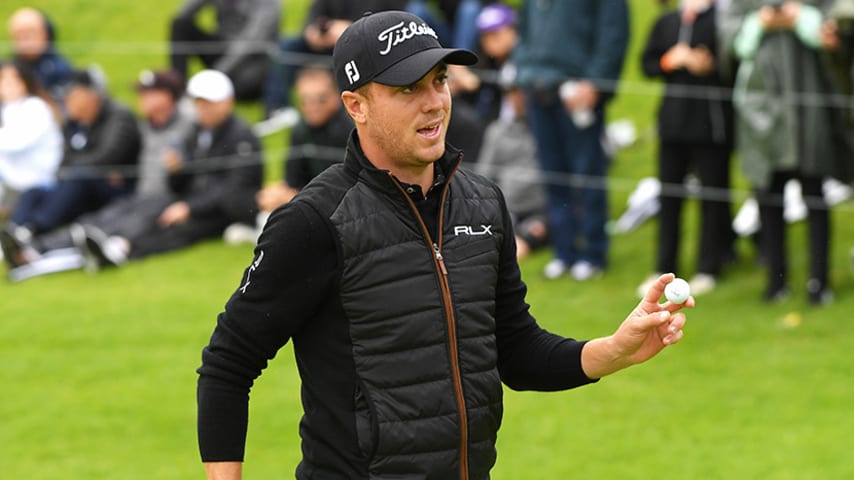50 years later, Sifford’s cigar-less victory still resonates in L.A.
5 Min Read

Written by Helen Ross

Tiger Woods reflects on the legend Charlie Sifford
Charlie Sifford was a bit out of sorts when he teed it up in the first round of in the 1969 Los Angeles Open.
He had been battling the flu. Or maybe it was just a bad, bad cold. Whatever had him under the weather, though, Sifford’s lungs rebelled, and he couldn’t bear to light up one of his trademark stogies.
“I hate playing golf without a cigar,” Sifford later recalled in his autobiography, “Just Let Me Play.” “I get nervous and uncomfortable without that stogie in my mouth.
“But every time I tried to smoke one that week, I started coughing my head off.”
The break in his 25-year tobacco habit didn’t seem to bother Sifford that week 50 years ago as he played in the tournament now known as the Genesis Open. He opened with a 63 at Rancho Park that included a six-hole stretch on the back nine that Sifford played in 7 under, giving him a three-stroke lead.
“It was one of those magic rounds where it all comes together, and you start thinking about shooting at the pin on every single hole,” Sifford wrote in 1992.
The then-46-year-old Sifford, the first African-American to play on the PGA TOUR, led by two after shooting even par in the second round, then three again heading into the final 18 holes after another 71. He was paired with South African Harold Henning in the last round.
Sifford had quite the partisan cheering section that day. A native North Carolinian who learned the game by caddying for 60 cents a day in Charlotte, he made his home in Los Angeles at the time. His wife Rose and their two sons, Craig, a toddler, and Charles Jr., a student at Cal State Long Beach, were also in the gallery.
“There’s nothing like being ahead on the last day in your hometown,” Sifford wrote.
He needed that support, too. When Sifford bogeyed the 12th hole, he was tied with Henning and Dave Hill, who was in the penultimate group. A 20-footer for birdie at the 14th then gave Henning sole possession of the lead.
Sifford birdied the 16th hole to pull even with the South African. After saving par from 6 feet at No. 17, Sifford had to two-putt from 40 feet at the 18th to force a playoff with Henning, whose birdie putt had stopped inches from the hole.
Unlike two years earlier, when Sifford won what is now known as the Travelers Championship, he said he was more “exhilarated” than nervous as he battled Henning down the stretch. But there was something missing.
“Man, how I ever made it through that tense day without a cigar, I’ll never know,” Sifford wrote.
Sifford ended up sealing the victory on the first playoff hole with a pinpoint 9-iron that settled 3 feet from the hole for birdie. He wrote in his autobiography that his heart was beating so loudly he thought he’d drown out the cheers of the partisan crowd.
“This time I didn’t cry when they handed me that big, oversized check for TV,” Sifford wrote. “I laughed. Rose was at my side and she laughed, too. It was one of the best times I’ve ever had.”
Sifford celebrated that night at Willie Davis’s Center Field Lounge. Among the attendees were other African-American golfers who were looking for places to play, men like Lee Elder, Rafe Botts, Pete Brown and Bill Spiller.
A month later, the golfing pioneer was honored with a parade in L.A.’s Watts neighborhood on Feb. 3, which had been proclaimed as Charlie Sifford Day. There was a party that evening at a nightclub called the Black Fox.
“It’s just so wonderful to think that a black man can take a golf club and be so famous,” he told the crowd at the nightclub. “I just wish I could call back 10 years.”
A decade earlier, of course, he would have been in his prime. But the PGA’s Caucasian-only clause wasn’t lifted until 1961 and even after it was, Sifford and other black golfers still battled to find places to play the game they loved.
Even prior to Sifford’s victory in Los Angeles that week, Pulitzer Prize-winning columnist Jim Murray of the Los Angeles Times wrote this about the man:
“Before Charlie Sifford, if a Negro walked on a golf green in this country, chances are he was carrying somebody else’s clubs and/or a wet towel to wipe somebody else’s ball.
“If he was in the grille room, he was carrying somebody else’s coffee. He came to fix a shower, not take one.
“Golf was not a game for the ghettos. Neither did it leave any time for carrying picket signs, joining demonstrations or running for office. Charlie birdied, not talked, his way through social prejudice. He broke barriers by breaking par. His weapon was a 9-iron not a microphone. Charlie stands as a social pioneer not because he could play politics but because he could play golf.”
In 2004, Sifford became the first African-American inducted into the World Golf Hall of Fame. Five years later, the Genesis Open began offering the Charles Sifford Memorial Exemption to a deserving minority golfer. This year’s winner is long-time pro Tim O’Neal. Three of the past recipients – Cameron Champ, J.J. Spaun and Harold Varner III -- are now playing the PGA TOUR.
Tiger Woods, who calls Sifford calls the “grandpa that I never had,” now hosts the Genesis Open, which benefits his foundation. He is keenly aware of the importance of Sifford’s win 50 years ago.
“It meant a lot to all of us who are participating in the game who are nonwhite to have Charlie have had the success he had, to have him go through the struggles that he went through to win here,” Woods says. “It's such a historic site, and against some of the best players that ever lived, was something that was very special.
“If it wasn't for Charlie and others who paved the way, I don't think my dad would have ever played the game of golf and hence, I probably wouldn't be here doing this press conference and be involved in the game like I am.”











